So. . . you might remember that one of the ways I practice my French and Italian is by listening to podcasts. Perhaps you also remember that I do this while walking — due piccioni con una fava (two pigeons with one bean, thank you, Georgia, for this kinder version of “two birds, one stone”). In fact, I even built a little series around this habit. Posts in which recount what I learned in the podcast, share photos taken en route, and show you my walking OOTD (outfit of the day) — I’ve tagged these posts #walkingwearinglistening.
Since the plan is to wear clothes while walking and listening, let’s get me dressed first. Windy and rainy here last week, with temperatures around 5 to 8 degrees, Celsius. So . . . a merino turtleneck, Harris Tweed plaid skirt, 11-year-old boots (loved them from the get-go!) and a faux fur vest of similar vintage (check it out in my WayBack machine 😉 . . . accessorized with unruly curls, slightly quizzical expression, and a modicum of camera blur. . .

I wasn’t sure the vest could layer under my coat, but I really wanted that furry warmth between my neck and the day’s feisty wind. And I ended up liking the look and finding it comfortable (the coat, also Harris tweed, is roomy, surprisingly lightweight, and I buttoned up when I needed more warmth along the way).
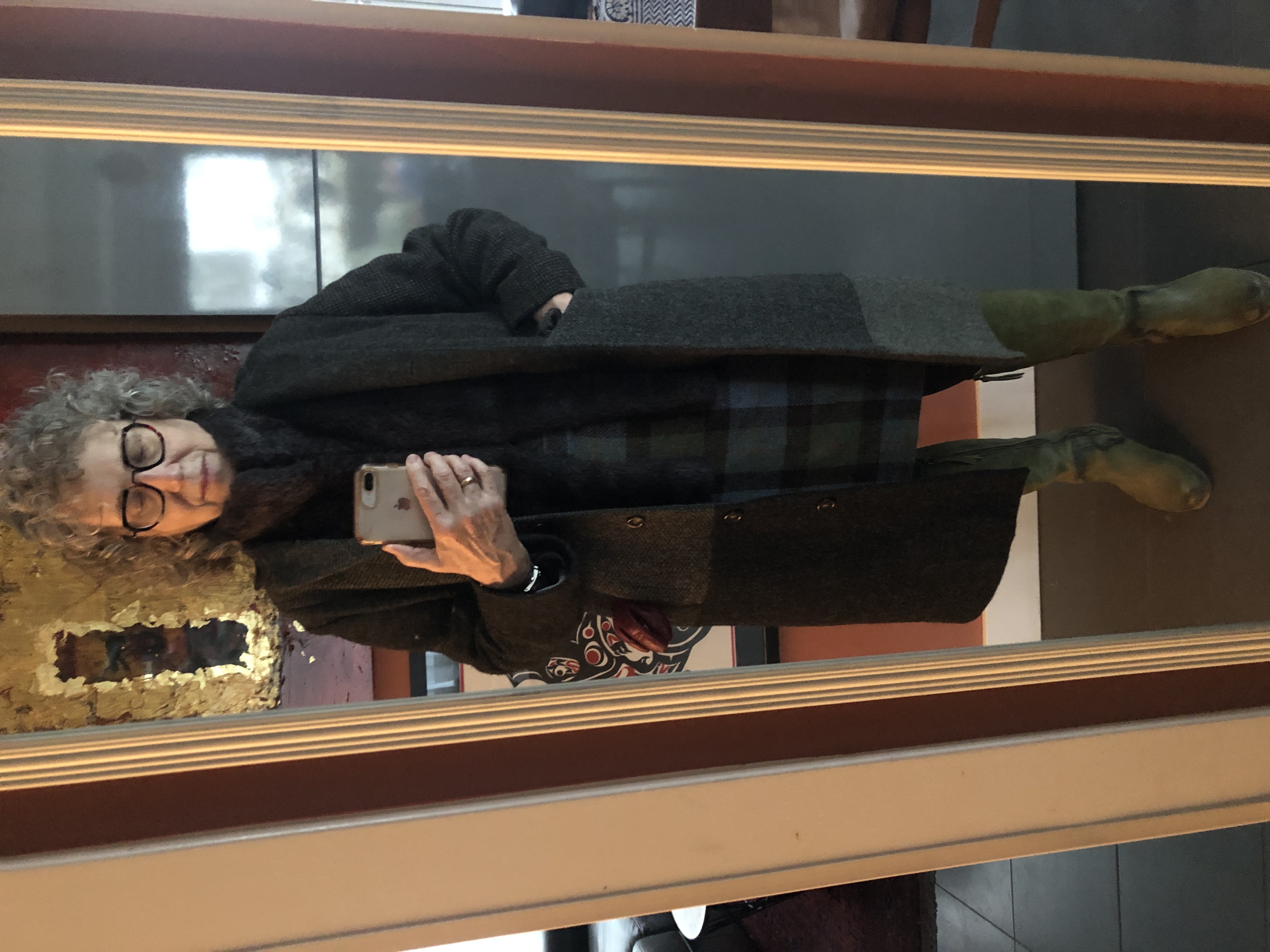
It’s been a while since I last posted in this series (back before we went to Naples), but I was deeply moved by something I heard earlier this week and immediately wanted to share. The podcast was Eleonora Silanus’s Italiano con Amore; the episode was #103 (the link is to Spotify, and the episode is in Italian), “Liliana Segre: una storia da non dimenticare.” I hadn’t heard of Liliana Segre, but learned that she is one of only 35 survivors of the 776 Jewish Italians under fourteen who were sent to the Nazi death camps. And that she was sent to Auschwitz from Binario 21 (Train Track 21) in Milan’s Central Station (Milano Centrale) on January 30th in 1943.
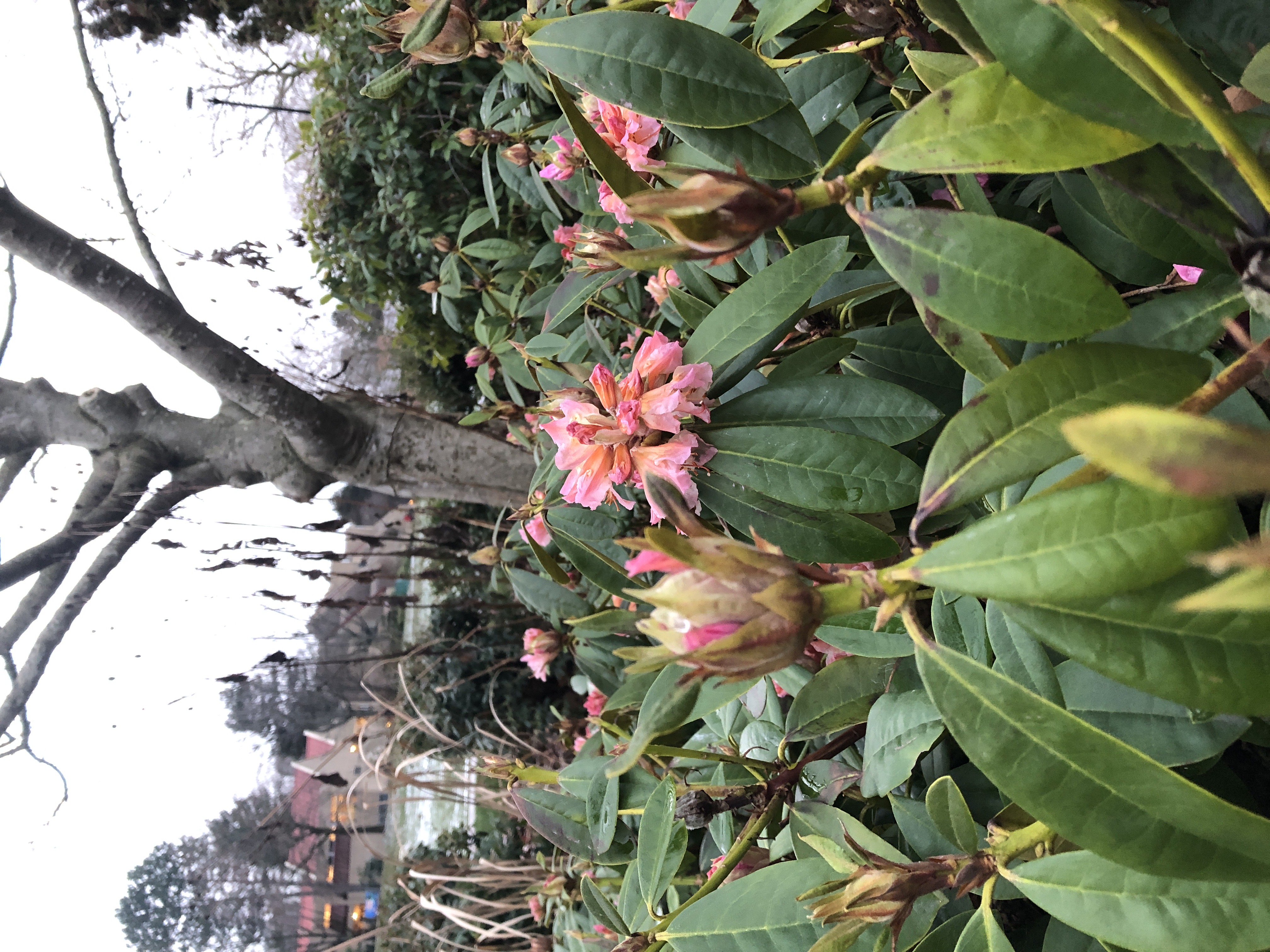
I’ve also learned that she is an Italian Senator — and that, at 92 years old, she’s under police protection after having received anti-Semitic hate messages, including death threats. Here is a January 2020 video interview with Liliana Segre — with a voiceover (and subtitles) translating the Italian into English– in which she speaks about her experience at Auschwitz in light of the current rise of anti-semitism and fascist politics. The website also has a transcription of the interview.
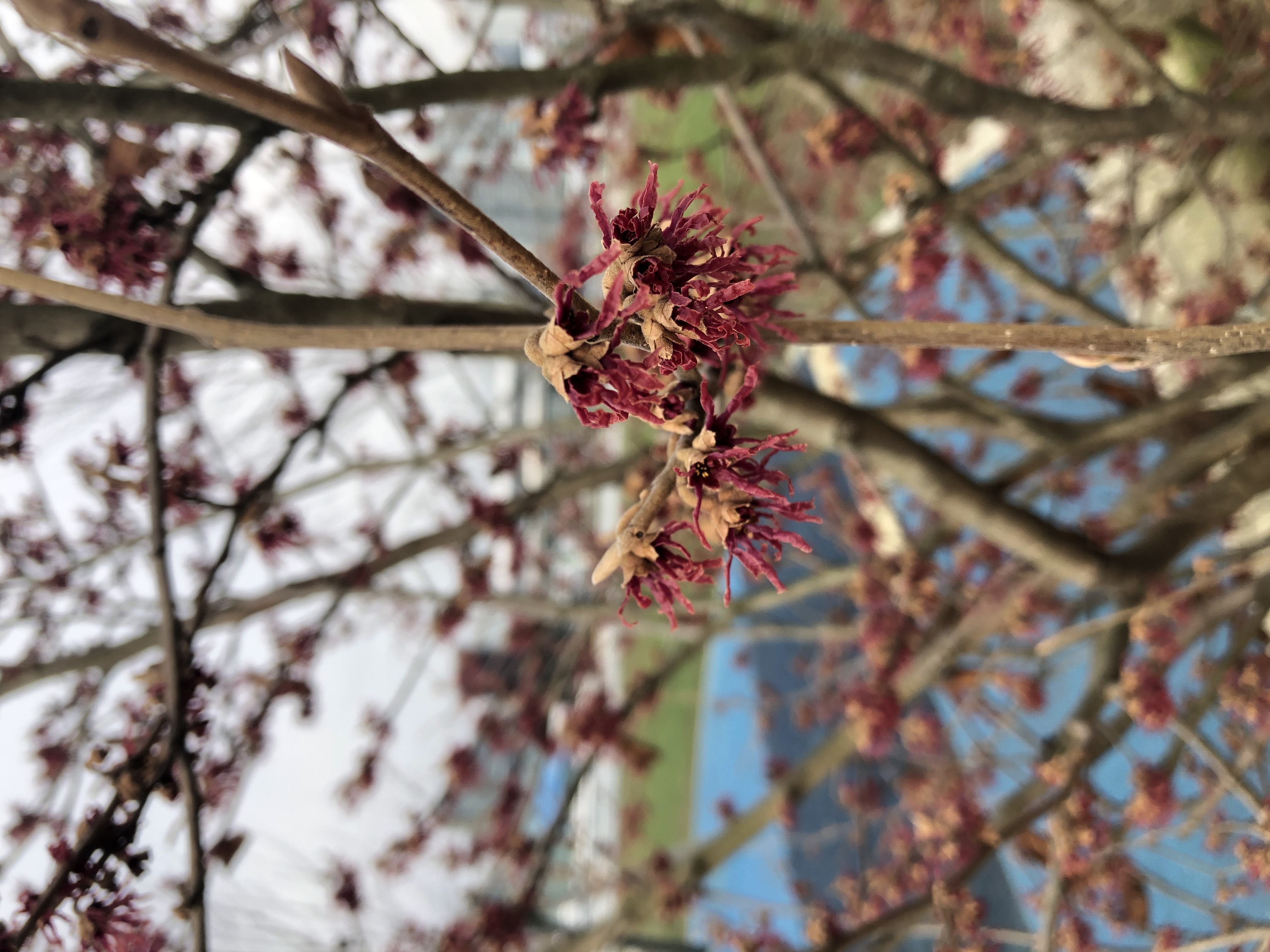
Since that 2020 interview, this past October Senatrice (Italian title for a female Senator) Segre opened the new Italian Parliament, setting off events, as German’s international news broadcaster Deutsch Welle (DW) tells us, that formally brought to power Italy’s most far-right government since WWII. In her speech (for which all 200 Senators gave her a standing ovation), she remarked that she was “particularly moved by the role that fate holds for me. In this month of October, which marks the centenary of the March on Rome that began the Fascist dictatorship . . . it falls to me to temporarily assume the presidency of this temple of democracy, which is the Senate of the Republic.”
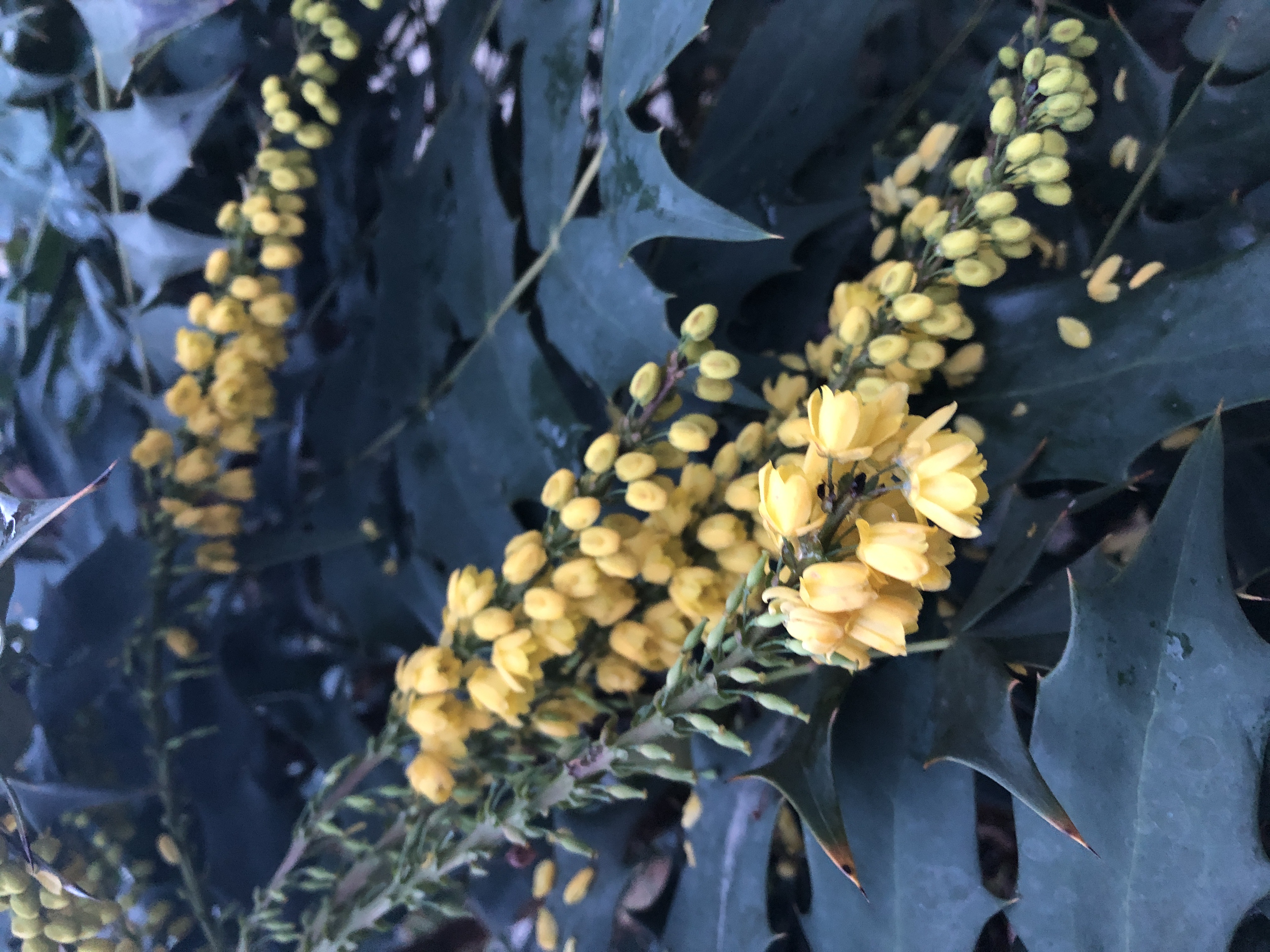
After commenting that Segre, “became emotional reflecting on what racism and fascism had done to her youth,” the DW article (worth reading in its entirety; it’s relatively brief) resumes its direct quotation (in English translation) from La Senatrice’s speech: “It is impossible for me not to feel a kind of vertigo, remembering that that same little girl who on a day like this in 1938, disconsolate and lost, was forced by the racist laws to leave her elementary school bench empty. And that, by some strange fate, that same girl today finds herself on the most prestigious bench, in the Senate.”
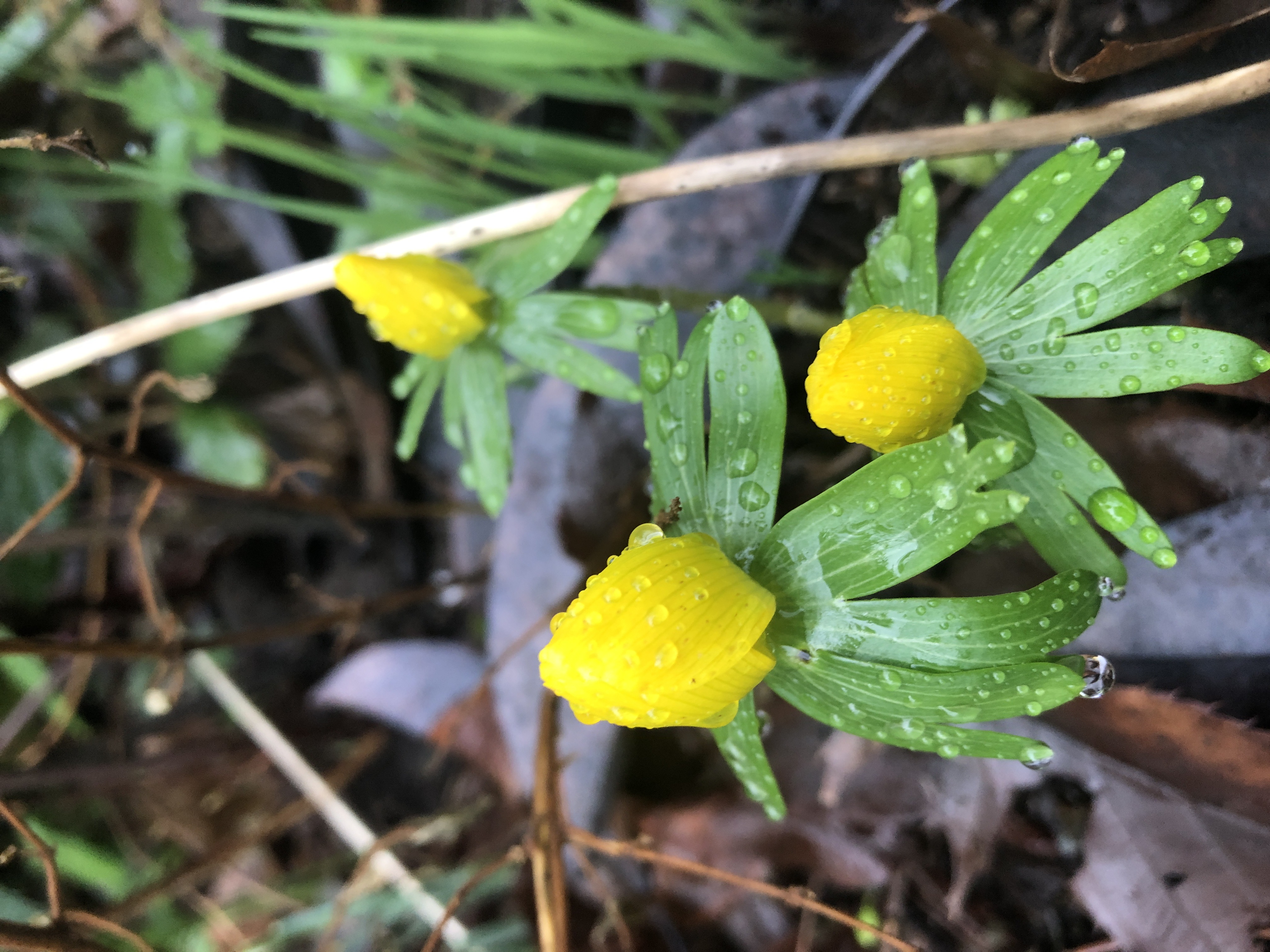
But all of this I learned about Liliana Segre after I came home from my walk last week after having listened to Eleonora Silanus’s podcast. What struck me most in the podcast itself was a description of Liliana at 13, newly arrived in prison, having been spared death only because she looked older than her years, being tall and also exhausted by the journey, little left in her appearance to mark her as a child. Eleonora, having read and listened to Liliana Segre’s accounts of that time, tells us that the 13-year-old Liliana felt cold, alone, abandoned under the derisive regard of the guards, that she searched for some solidarity, some comfort against what felt like the world’s cruel indifference.
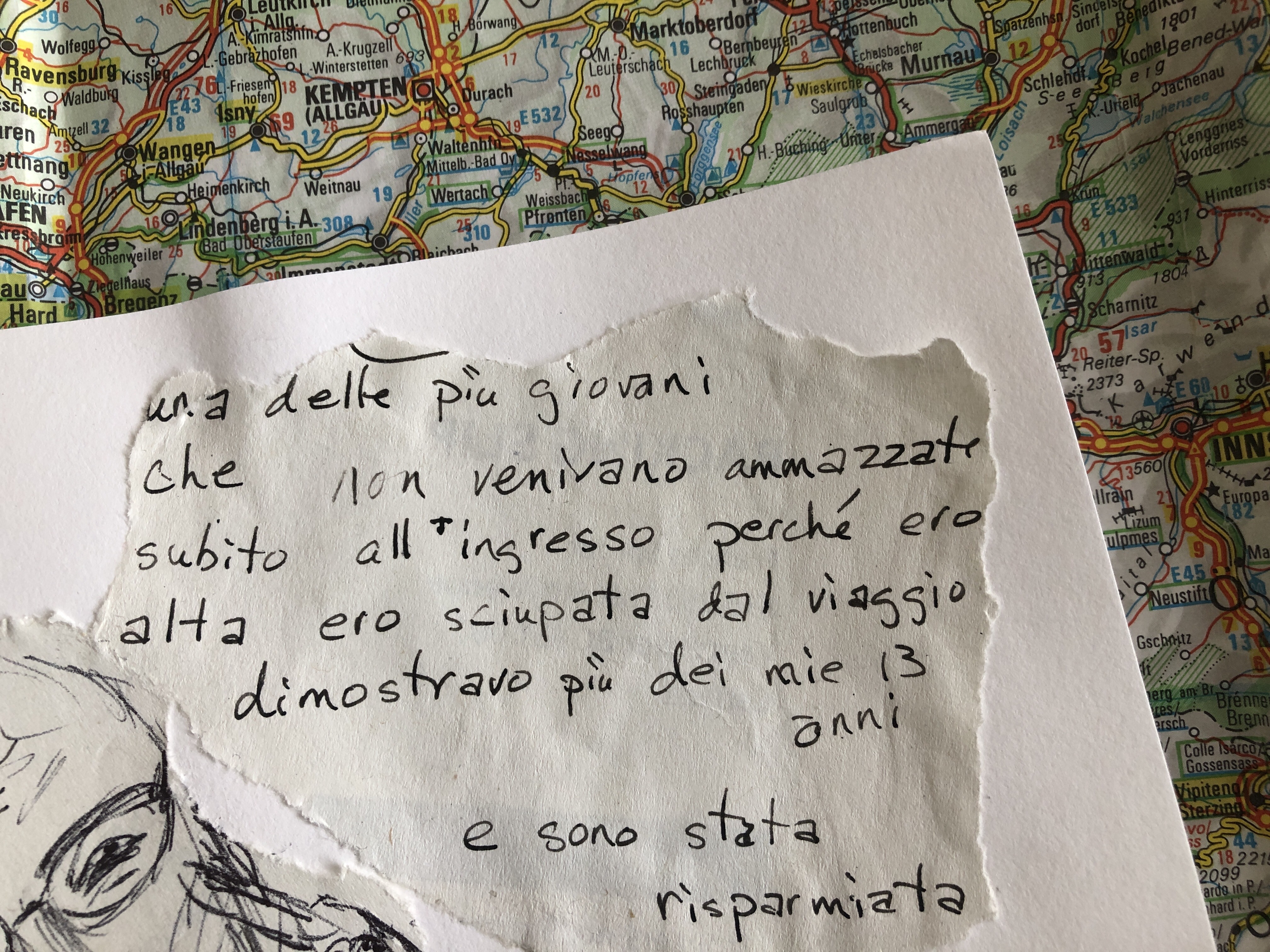
And she caught the eye and held the gaze of another girl, about her age. Unfortunately, neither could speak the other’s language. But then Liliana remembered the Latin she had learned at school before she’d been expelled five years earlier, at eight years old, when Racial Laws forbade education to the Jews. She tried it out, giving it a significance it had never held in the classroom: Patria mea pulchra est — My country is beautiful. To which she added, Familia mea dulcis est — My family is sweet. And then Cor meum et anima mea tristes sunt — My heart and soul are sad.
That the two girls were able to communicate through a “dead language” they’d learned at school and thus find solidarity and solace in each other’s humanity was powerfully moving to me. I’ve been hearing and reading about the potential of computers, of increasingly sophisticated artificial intelligence, to obviate the need to learn other languages. This anecdote, this moment when an ancient language (with accretions of negative and positive connotations stretching back millennia) brought light to il buio, the darkness. Hard to imagine an algorithm that could capture the elements of humanity nestled somewhere between our tongues, our minds, our hearts, the way language links us back and forward, connects us…
But I won’t take that detour today. Instead, I’ll tell you that after Liliana was liberated, she lived with her maternal grandparents (the only family members still alive) until she married in 1951. With her husband (a Catholic political prisoner who had also survived the Nazi concentration camps), she raised three children — and never spoke publicly about her experience of the Shoah. For 45 years!
What silenced — for 45 years! — the young woman, the wife, the mother, who, as a thirteen-year-old had reached for a once-studied ancient language to vault a linguistic barrier in her desperate need for human connection? As Senatrice Segre tells us in this video by the Fondazione Centro di Documentazion Ebraica Contemporanea / Center of Contemporary Jewish Documentation(in very clear, beautifully spoken Italian, no translation unfortunately), it was evident after the war that people didn’t want to remember its ugliness. She sensed only indifference or discomfort when she made any allusion to that time, and so she kept her knowledge and experience to herself. Not speaking of it even when her children asked her about her tattoo, exposed during excursions to the beach and, as she wryly explains, tattoos not generally fashionable in the 60s.
But in the early 1990s, urged and encouraged by a friend, she moved Dal silenzio alla testimonianza, (From silence to testimony). . . .As she says in the video, “Io ho vomitato la mia testimonianza per anni” (I vomited my testimony for years).
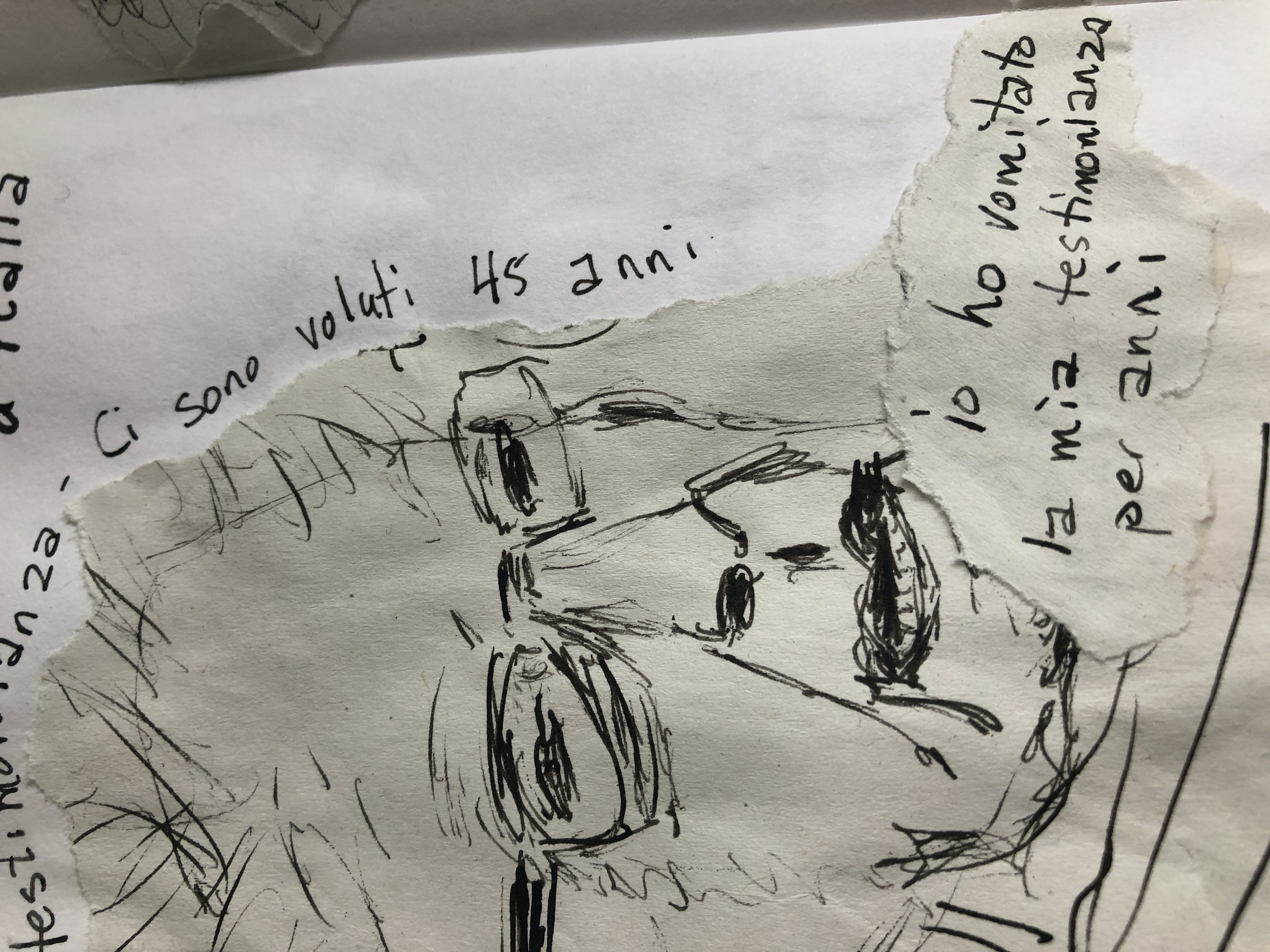
Once she began speaking, she quickly realized the importance of doing so, both for her own healing and for that of her Jewish community and of her country. She speaks of the difficulties, the seeming impossibility, inherent in this witnessing, but also of the inspiring work of Primo Levi who pushed against, past, through the ineffability of the suffering. She describes herself watching Claude Lanzmann’s powerful documentary film Shoah: Quando ho cominciato guardare Shoah di Lanzmann, ho detto “Povera me” (when i started to watch Lanzmann’s Shoah, I said “Poor me.”)
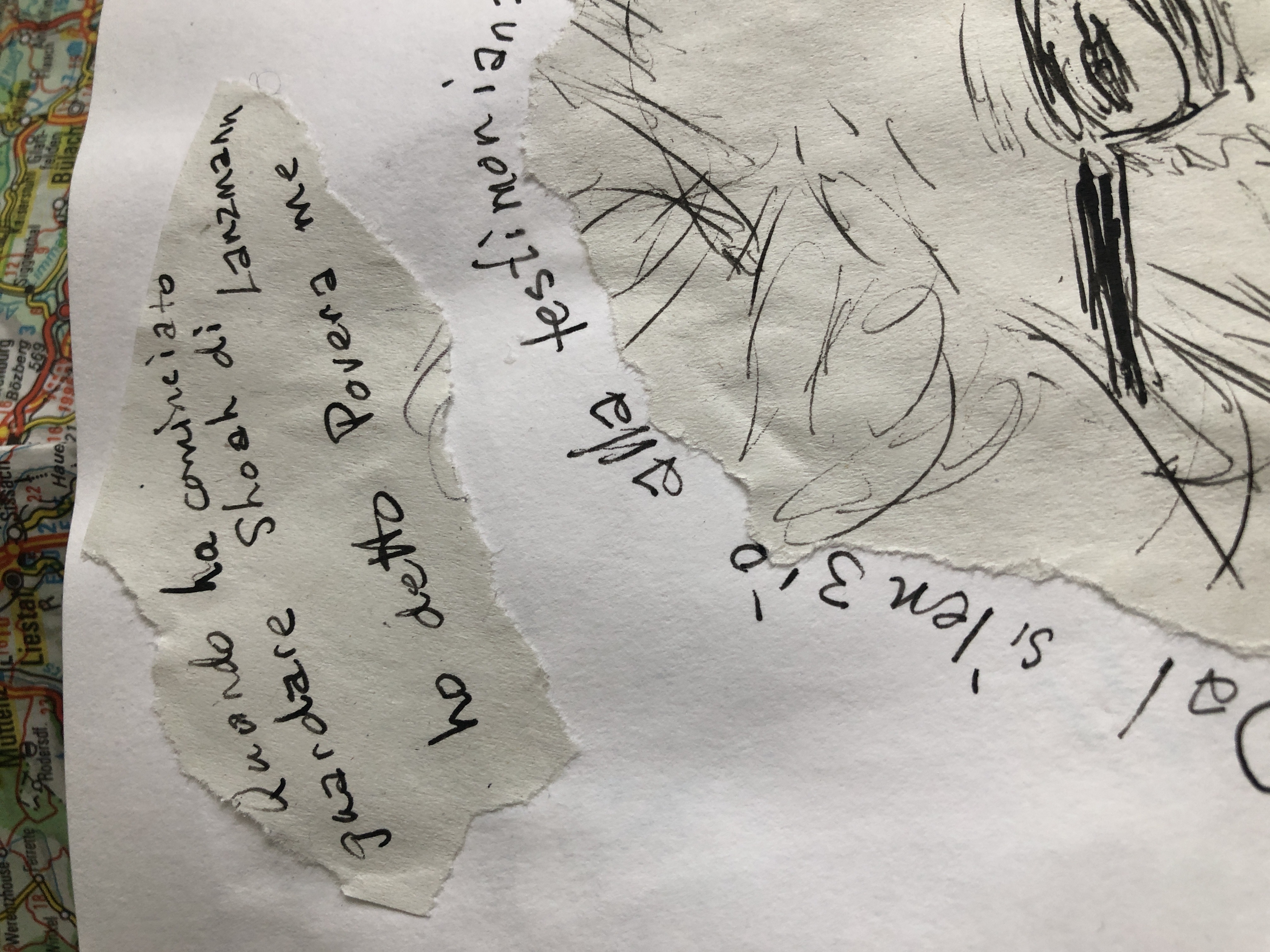
Since she began speaking publicly, Liliana Segre has addressed thousands of young people at school assemblies and conferences. She’s been interviewed in print, in video, on film, and her words have been published in various books and articles. Further, she’s been awarded honorary degrees by several prestigious Italian universities . . . and on the 80th anniversary of the Racial Laws that banned her from school when she was eight years old, she was appointed Senator for life. And thus she was in a position to address the new Italian parliament, all of Italy, all of us facing the rising threat of fascism, last October.
This article (in English, in The Guardian) reports on her fear, her “nightmare” that “the Holocaust could end up turning into just one line in the history books.” Thus she calls on all of us to Remember! to Speak, Tell the History! She urges the importance of Memory against Indifference, such indifference being a dangerous aid to racism and hatred. On January 30th, just last week, as I learned in Eleonora Silanus’s podcast, a crowd gathered at Milano Centrale’s Binario 21, the train track from which a young Liliana was sent to Auschwitz on January 30th 80 years ago. They gathered to commemorate this event, against indifference.
Those gathered to remember a hateful and tragic moment in Italy’s history acted, thus, in accordance with Liliana Segre’s words, quoted by Eleonora in that podcast:
Se qualcuno sarà candela accesa e viva della memoria, la speranza del bene e della pace sarà più forte del fanatismo e dell’odio. . . . Or, in my rough translation: “If someone will be (is willing to be, will act as) a a lit and living candle of memory, the hope for goodness and peace will be stronger than fanaticism and hatred.
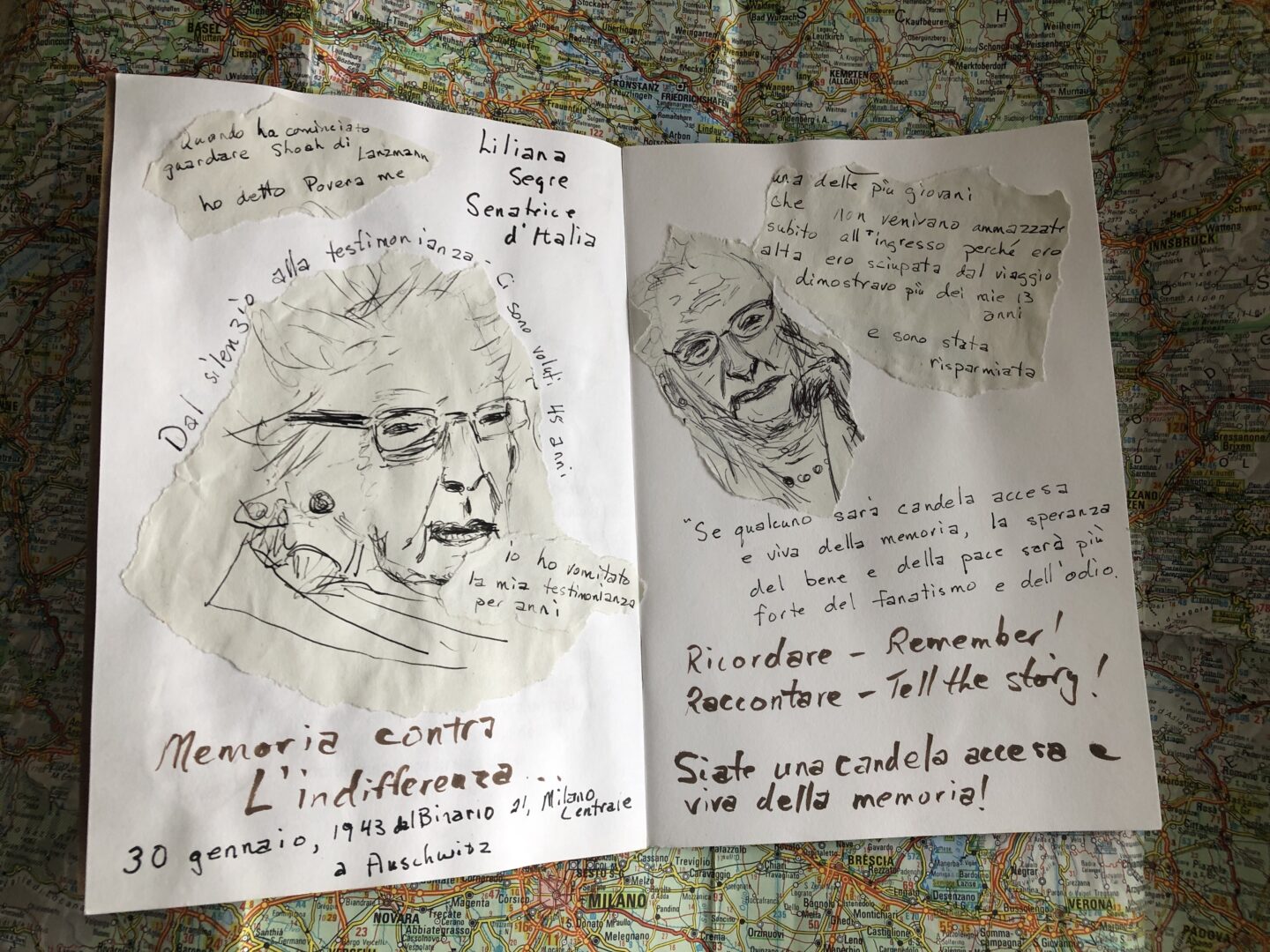
Finally, I’m sharing with you some pages from my sketch journal, made in response to that podcast and to the research I did after hearing it. (I posted the “warm-ups” to this portrait sketch on Instagram, if you’re curious.) As I’ve done regularly throughout my journals, I sketched and scribbled on scrap paper, then tore and pasted the sketches and scribbles onto the sketchbook pages. Never has this approach suited me as it did for witnessing and responding to the testimony of this powerful and inspiring 92-year-old woman. It slowed me down, focused me on materials, on the materiality of what happened, anchored the memory to a specific tactile and sensory experience. These journal pages — and this post, of course — are my small attempt at being that lit and living candle of memory.
Thanks for walking with me again and for “listening” with me. I did debate including the What I Wore photos, but decided to maintain consistency with the other posts, also thinking that we should perhaps not confine our remembering to sombre, serious, elevated moments. This approach has the potential danger of silencing memory — so I’ve allowed the supposedly superficial to mingle with the more charged aspects of the post. And since I’m mentioning Matters Sartorial, do take note, when you Google for images and/or videos of Senator Segre, that she is always beautifully groomed and elegantly dressed — a very stylish 92-year-old as well as an illustrious and inspiring one. Una donna strepitosa!
Comments always welcome.
xo,
f

Beautiful post, Frances. I love the idea of walking and listening. And really admire your continued effort to learn another language. Let’s hope that all of the “lit and living candles” do stave off extremism… over there and over here. I’ve been thinking a lot this week of the teachers in Florida and their classroom libraries. 🙁
Author
Thanks, Sue. And you’re right to make that connection with the banned books in Florida. Horrifying and sad.
Wow Frances. Thank you for this. This is intensely moving.
Author
Pleased that it touched you, Sally.
Thankyou for drawing the Guardian article to my attention, I’d missed that . Many years ago I liked to encourage my much older workmates to share their wartime memories with me & I heard some truly amazing stories of hardship & bravery . There was Joe the Battle of Britain pilot , Clive the radio operator on a tiny tropical island & Wally who escaped in a small boat from Singapore just before it fell to the Japanese . I really had to revise my opinion of my workmates .
Author
So many stories. . .
Frances – many thanks for this link to such a strong woman. I too am learning Italian in my Third Age and may use what I’ve read this afternoon in tomorrow’s class. Elizabeth
Author
You’re very welcome, Elizabeth — I told my class, this past Saturday, some of what I’d learned, and they were all very interested. I’m sure you’ll find the same with yours.
Very interesting- thanks for sharing.
Author
You’re welcome.
We love Italy too and one of the most moving experiences we’ve had is a visit we made to the Fosse Ardeatine Memorial outside Rome. I cribbed the following from visitjewishitaly.it:
“The place is associated with the years under Nazi occupation, and commemorates the massacre by the SS as retaliation for the Partisan attack in Via Rasella when thirty-two German soldiers were killed. On the evening of March the 24th, 1944, three hundred and thirty-five people were rounded up from the city’s prisons – among them, seventy-five Jews – and taken to Via Ardeatina, where they were slaughtered. The underground passages were then blown up to conceal traces of the massacre and the bodies were retrieved only after the war.”
The mausoleum contains the remains of the 335 who were slaughtered. The event is commemorated every year but we were the only visitors that day. Via Rasella, not far from the Trevi Fountain, is where the attack took place that led to the massacre, and the marks are still on the walls.
I hope that some of your readers will be introduced to this event, much like your wonderful introduction to Liliana Segre today.
Author
Thanks, Elizabeth — it might have been you who suggested I visit this Memorial last Spring. I posted some photos about that visit on Instagram. A very moving site, and another example of historical events whose memory should be kept alive.
Thank you for this post today. I fond it especially moving as in the news this morning was the fact that hundreds of hateful anti Semitic leaflets had been spread at the homes of residents in a primarily Jewish neighborhood in Atlanta Georgia. Of course it was widely condemned, but we can never forget.
And I always enjoy the outfit posts.
Author
You’re welcome, Darby. Isn’t it so hard to believe this hatred is again being fomented and spread!?
Another two pigeons spared!
I read about Senatrice Segre last year (I think) when she invited an influencer (Chiara Ferragni) to join her at the memorial and then post about it. The Senatrice felt it was a way to bring this history to the attention of young people via Chiara’s huge online presence. And that meeting did subsequently happen. (I read about this in the Italian news so my details could be a bit fuzzy but that was the gist of it.)
I am reading Primo Levi If Not Now, When?/Se non ora, quando? I added it to my list when I was deep into Natalia Ginzburg a while back. I can’t read these stories in large doses, it seems to dull the impact but something comes to the top every year.
Maybe because of all this reading I find the word ‘buio’ very intense; it seems to be used so often in a spiritual or emotional sense, more than we do with ‘dark’ or ‘darkness’.
And! Last but not least. I think I mentioned I’m going to do Italian classes when I’m in Venice next month. I’ve thought about this for years, but it was only when I was researching this time that it dawned on me…I will be able to speak to people with whom I share only Italian as a common (second or beyond) language.
And there was lots more, now deleted, because a comment longer than the post is a rude sort of hijacking which I have come close to committing. 🙂
Author
Oh, don’t do that! Don’t delete — hijack away 😉
My Italian teacher mentioned the connection with a Social Media influencer — this is a savvy woman, right, to use this conduit to teach this history?
Agree with you about having to spread this kind of reading — I once took an upper-level undergrad course in post-war German Literature (in translation), and whoa! that was “molto buio”! Very worthwhile, but dark, heavy, challenging. . . .I agree with your reading of the word “buio” — Dante cemented those connotations!
I love that observation about your Italian class in Venice! I’ve built and sustained friendships (in Italian and French classes) based on conversations only in a second language, but in those we generally had English in common, even if we didn’t use it. What you’re talking about is something different. . . something that many people in the world do regularly with English as the “lingua franca,” of course, but rarely necessary (or possible) for us.
We forget or set aside at our peril. Many years ago, when a student nurse, I went to help a younger nurse who was having trouble getting a patient to go down to X-ray, just a simple and everyday procedure in hospitals. I can see him now, terrified, clutching his battered suitcase which was practically empty. Dressed in pyjamas and loudly refusing to go. At which point I noticed the numbers tattooed on his wrist and all slipped into place. No wonder he was afraid, no matter that he had survived the camps and settled in London. Once I had sent the porter away, told him that he didn’t have to go if he didn’t want to and managed to get the suitcase from his grip, he calmed down, even apologising, which seemed to make the whole episode even more pathetic (in the real sense of that word). Some things cannot be got over, I think.
Author
That must have been such a moving experience — he was lucky you were there and knew how to help him.
Thanks, Frances, for this account. I didn’t know about Senatrice Segre but now I will learn more. Your post is important and deeply moving. And your sketches are great!
Author
Aw, thanks Carol! She’s worth learning more about (and if you get a chance to watch a video or two with her speaking — her Italian is so clear!)
What a moving post. Thank you x
Author
You’re very welcome, Genevieve.
I am so glad that I came to your blog today and read this amazing piece. Thank you for sharing the story of Liliana Segre. I feel a bit like curling up in a ball and having a good cry, partly over the evils that we humans are capable of and partly over the incredible bravery of those who stand up against and speak out against such evil. Segre is a remarkable woman.
I hope that Segre is right that we cannot possibly repeat history, but I fear that we might. Remembering and speaking about historical events is crucial to avoid repeating things that were so wrong.
On a lighter note, the photos of flowers in winter are refreshing and very pretty. I love the color blue in your skirt. I would enjoy wearing that pretty wool skirt and it looks great on you.
Author
I hope she’s right as well — she’s less sanguine in more recent videos and more urgent in her exhortation to all of us to be the lit candles.
I’m glad you enjoy the lighter aspects of the post — I hoped to mitigate a bit so that we can raise ourselves up after having had that good cry. There is still much good and much beautiful in the world. xo
Finally had a quiet moment to read this post. I will definitely follow through with reading more from the links you shared. I had not previously heard Liliana’s story, but as a Jewish woman who was born 12 years after the end of WWII I was raised with so much consciousness of the Holocaust, and have known many survivors of the concentration camps. How marvelous this particular story is! And—it is a stunning reminder that we are living in times (certainly in the USA) where racism and antisemitism have become normalized and stronger again.
Thank you, all of you who stand up for what is good and what is right.
Author
It must be even harder hearing these stories from a closer perspective as you do. But yes, her story is inspiring. I grew up in the shadow of WWII (born early 50’s) and we were all so horrified by the evidence of systematized racism and hatred that we couldn’t dream we’d be seeing its growth again.
Thank you for this post Frances, beautifully written and signposting me to something I was unaware of.This is the best kind of multitasking – and something I do myself – more so now because along with some other life changes – we made a big decision to get rid of our car.
In Scotland we are fortunate to have free bus travel in cities and other subsidised trips for me a senior of 61.
I often listen to podcasts while walking or on the bus – usually catching up on arts review programes or as you might imagine – stories about food.
I am glad you included the OOTD – your walking outfit was stylish and practical and as you highlight Senator Segre was like you, a very stylish lady as portrayed in the Guardian article. I love that Harris tweed coat.
I am about to walk to the gym with some podcasts lined up – alas my outfit is rather pedestrain ( 😉
Margaret
PS – also loved the aconites and mahonia all colour gratefully received in February
Author
Glad you enjoyed the post, Margaret — and brava on that big decision! We’re keeping ours for now (22 years old), but only use it sparingly — the city makes that fairly easy and keeps me fit 😉
Aren’t those aconites and mahonia cheery?! Great design, organizing those to bloom in February 😉
Thank you for lighting the candle for Liliana Segre and the millions like her. Lest we forget.
Author
Thanks for joining me, Mary.
Such a poignant fascinating story-beautiful post Frances!
I hadn’t heard of Senatrice Segre so far
How terrible that she was silenced for so many years
The power of languages, living or dead……
Latin ” Quot linguas calles,tot homines vales”…. How many languages you speak,that many people you are worth
Dottoressa
Author
And silenced by what she saw as indifference to her story — sometimes we can do good just by listening, by witnessing.
What a fabulous Latin quotation — thank you for this!
I had read about Liliana Segre before – maybe when she made the opening speech of the Italian parliament some time last year. Your post reminded me of this extraordinary woman. (And wasn’t it ironic that after her remarkable speech the political power went to Giorgia Meloni and her neofascists?)
Those who cannot remember the past are condemned to repeat it, as they say, and in my country we carry a particular responsibility for preserving the memory of past crimes comitted by our grandparents (or their compatriots). As the number of witnesses is diminishing, we face the challenge to find new ways of passing the knowledge of the past and the responsibility for not repeating it to the next generations.
On a trip to Italy with one of my history classes we visited the Fosse Ardeatine. Most of my students were very moved when they realized that quite a few of the victims of that massacre werde young boys of about their own age.
Thank you for drawing my attention to Eleonora Silanus’s podcast. I will certainly listen to more of her posts, even though I must admit that when out walking I prefer the sound of the birds.
Author
Yes, ironic — and powerful that she made a remarkable speech warning against current dangers even as she was opening parliamentary proceedings for this new right-wing government. She is going to keep speaking truth to power!
(and I share your preference for making birds my walking soundtrack and leaving space for my own wandering thoughts, but the podcasts have really supported my language-learning and this is the best way I’ve found for listening to them consistently)